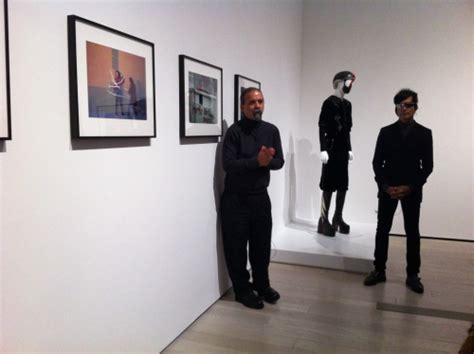A Quote by Cesare Pavese
The whole problem of life, then, is this: how to break out of one's own loneliness, how to communicate with others.
Related Quotes
Where my earlier works, what sets them apart is that I didn't need approval and I didn't need permission from anyone because I wasn't being paid. So, to me, I was allowed the freedom, the total freedom to just communicate how I wanted to communicate and my whole level of perspective was to communicate to the barrios, communicate to the gangs and communicate to the people that frequent the thoroughfares that were populated by these gangs and by this life style.
When you work with a major label they create their own message for you and a lot of the time that works great, or at least it did back in the 90's but now it doesn't work, so I think as an artist if you learn your own business, like anybody would when they want to start a little restaurant - they'd figure it out and then build it and they work hard - then it could be your own little business that you grew to as big as you want it to be but you had much more control with how to communicate it and how it's cared for.
My whole effort is how to beautify this present moment, how to make people more celebrating, how to make people more joyous, how to give them a little glimpse of blissfulness, how to bring laughter to their life. Then the future takes care of itself. You need not think of the tomorrow, it comes. It comes out of this moment. Let this moment be of great celebration.
SOLIDAO, LONELINESS. What is it that we call loneliness. It can't simply be the absence of others, you can be alone and not lonely, and you can be among people and yet be lonely. So what is it? ... it isn't only that others are there, that they fill up the space next to us. But even when they celebrate us or give advice in a friendly conversation, clever, sensitive advice: even then we can be lonely. So loneliness is not something simply connected with the presence of others or with what they do. Then what? What on earth?
I feel like we're so limited by the context at which we look at life. The way we look at who we're supposed to be and how we're supposed to love... everything. I feel like that, in and of itself, is a project of a lifetime: the problem of how to break out of the limiting context that is imposed upon us by the educational system, by the church, by our parents... As a kid I rejected it without even thinking about it. Now that I'm a little older, I see how deeply destructive it really is.
Everything that you've learned: 'Make a lot of money, have a nice house'. But they never teach you at school how to relate, how to communicate with others, how to share values with others. ...They teach you how to make a living. You become an optometrist, he becomes a physicist, she becomes a structural engineer, he's an architect. In the future, none of that. Everybody is trained to be a generalist, so they understand different cultures, different values, how we get to be the way we are. So no-one can ever use you for war or killing anybody or hurting anybody
African tradition deals with life as an experience to be lived. In many respects, it is much like the Eastern philosophies in that we see ourselves as a part of a life force; we are joined, for instance, to the air, to the earth. We are part of the whole-life process. We live in accordance with, in a kind of correspondence with the rest of the world as a whole. And therefore living becomes an experience, rather than a problem, no matter how bad or how painful it may be.
If all females were not only well educated themselves but were prepared to communicate in an easy manner their stores of knowledge to others; if they not only knew how to regulate their own minds, tempers, and habits but how to effect improvements in those around them, the face of society would be speedily changed.







































